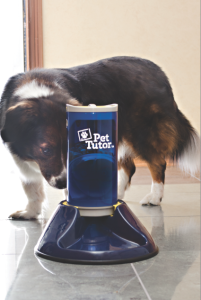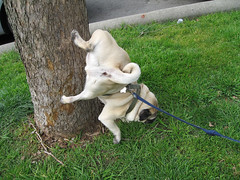So you’ve just come back from work, walked through your front door, and immediately notice the smell; this awful, yet familiar smell that unequivocally informs you that a dirty deed has been committed. Buster has relieved himself on the new living room carpet, again! Most of us will assume that solutions to this seemingly simple problem are pretty straightforward and certainly don’t require the help of professionals. But contrary to popular belief, effective dog parenting is not intuitive and preconceived ideas often lead to owner frustrations and their dog’s confusion.
Bored dog = Shredded book (Photo credit: urbanwild)
As mentioned in one of my previous blogs (‘
Can Dogs Really Feel Guilt?’), studies have shown that in the presence of pee or feces on the floor, or a chewed up pillow or piece of furniture, what dogs express is not guilt, but fear of the unpleasant consequence. Dogs are very good at picking up patterns and sequences of events, that’s how they can prepare for changes in their environment. They will, for instance, learn very quickly that when you go towards the closet in the hallway, you’ll take your shoes out, then your jacket. You’ll put them on, then grab your keys from the little table next to the door and head out. When dogs have anxieties about being left alone, their anxiety starts building up as soon as you head towards the closet, not only once you’re out of the house. Buster has learned what is the most likely sequence of events that will lead to your departure. We also know that they have acute abilities when it comes to reading human emotions (‘
You can’t lie to your dog’). Most dogs are very sensitive and will get very anxious when scolded so they’ll try what they can to avoid it.
When you come home and notice the dirty deed on the carpet, or your favorite pair of shoes chewed up, your adrenaline level immediately goes up and what is most likely to follow is Buster’s scolding. As this repeats, Buster puts 2 and 2 together and starts anticipating the scolding as soon as you walk through the door, when either feces or urine are on the floor or a shoe is out of the closet. This does not mean that Buster feels remorse for any of his actions produced hours ago. It doesn’t mean either that while he was chewing your shoe, or relieving himself on the carpet, the dog was thinking : ‘I know I’m not supposed to do this, but I’m going to show my owner that he shouldn’t have left me alone’. Dogs are smart, but this type of thought would imply that they can reflect on past events, make plans to deliberately upset you, then feel remorse for what they know they’ve done wrong. As we have mentioned previously (
‘Can Dogs Really Feel Guilt?), studies have shown that dogs do not have the abilities to feel guilt and in these situations, what the owner interprets as shame is really an expression of fear. The only thing that busted Buster will learn from being scolded is that the presence of liquid, feces or a shoe as you come home, is bad news for him.
So what are our options? We still need to teach Buster that relieving himself on the carpet, or chewing on shoes or furniture is not acceptable. We have learned from example that scolding or expressing our dissatisfaction to a child or another person generally gets the point across, at least temporarily. But for lasting results, as well as the use of methods that won’t undermine your relationship with our beloved pet, we have to look at the situation from his perspective.
Answers to the following questions will give us better insights into what may be at stake:
- Is the dog eliminating himself every day, every time he’s left alone or only when left for more than a certain number of hours?
- Does the dog chew on all sorts of objects when you’re around or only when left alone?
- Does the dog choose random objects or does he generally chew on your personal belongings?
Hazel_George_33 (Photo credit: Slick Vic)
A dog will generally eliminate indoors because he’s stressed, or has been left alone for longer than he’s physically capable of holding. Many times, when there is no physical problem, the dog simply has never developed a strong habit of going outside because the owner didn’t know how to teach him those habits.
When it comes to chewing objects, here again, the dog may be stressed from being left alone and is trying to alleviate some of his anxiety, or he could simply be bored and out of things to do while left for long hours. Here again, the dog may have never developed better habits because his owner didn’t know how to manage and redirect the dog’s natural chewing tendencies towards acceptable items.

Depending on the answers to the above questions, the owner may need to work with a professional trainer on helping his dog feel less anxious when left alone (separation anxiety), on ways to provide his bored pooch with more activities (‘How bored is your dog?’) and use management techniques to help him develop acceptable habits. In any case, dog psychology leads to far better results then simplistic punitive methods since it will address the root of the problem and will provide solutions that the dog can understand. A list of professional trainers could be found on the APDT website. Technology is also available and new products developed by companies like Smart Animal Training Systems will help owners address some of these issues, provide entertainment and improve the dog’s quality of life.
Dog parenting is not intuitive and turning towards those who can really help may save owners years of unnecessary frustration and costly repairs.
Jennifer Cattet, Ph.D.






Leave a comment